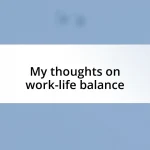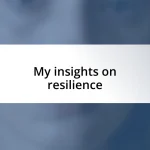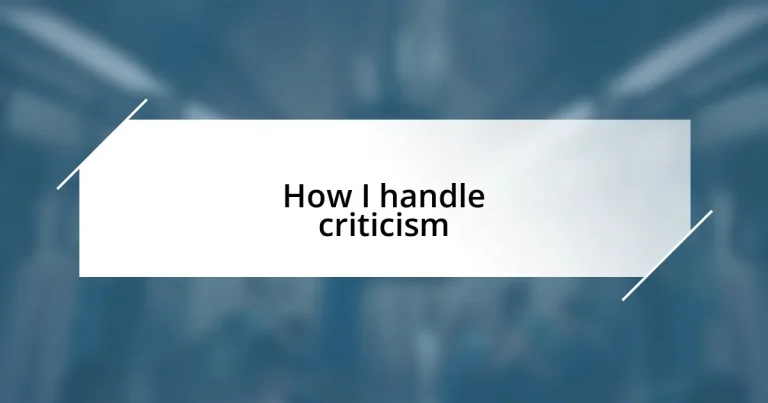Key takeaways:
- Criticism can provide valuable insights and opportunities for personal growth if approached with openness and discernment.
- Recognizing personal triggers and practicing mindful reflection can transform defensive reactions to constructive feedback.
- Proactively seeking feedback and fostering an environment of open dialogue leads to richer, more actionable insights.
- Building resilience through support networks and self-compassion is crucial for effectively handling future criticism.
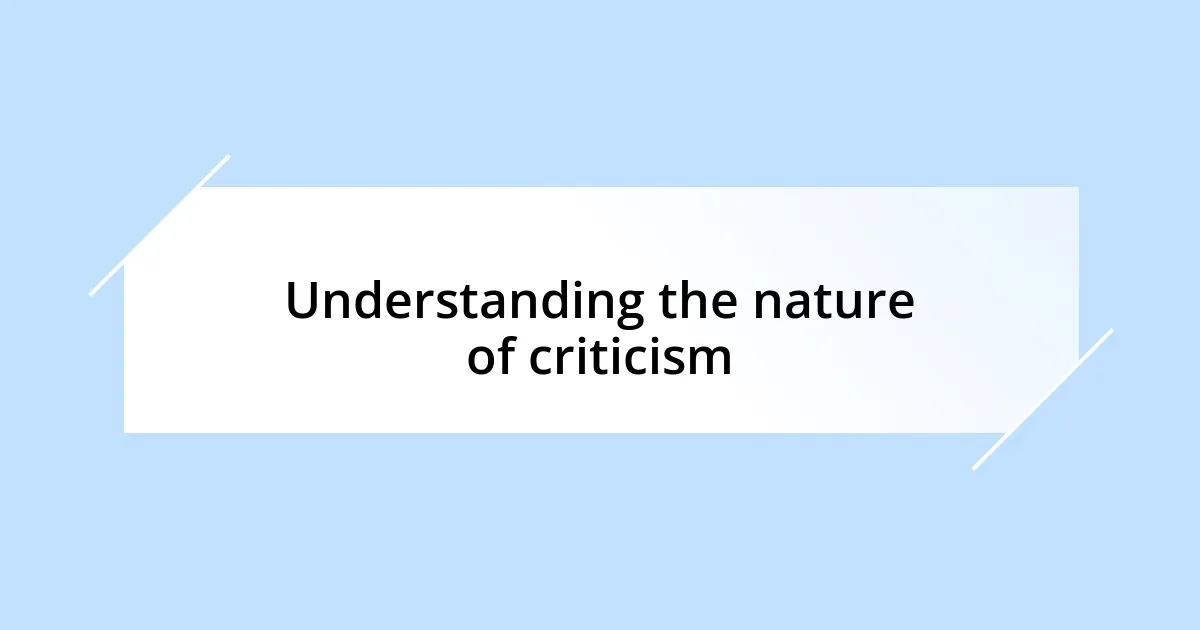
Understanding the nature of criticism
Criticism often stems from a place of differing perspectives. As someone who has faced a variety of opinions, I’ve learned that not all criticism is intended to hurt; sometimes, it’s simply a reflection of the critic’s own experiences and beliefs. How do you feel when someone gives you feedback? I’ve realized that rather than viewing it solely as a negative experience, I can see it as an opportunity for growth.
When I first started receiving critiques in my professional journey, I was overwhelmed by the emotions that came with it. I would often feel defensive, thinking, “Why are they attacking my work?” However, over time, I discovered that genuine criticism can lead to invaluable insights. Have you ever looked back and recognized how a harsh piece of feedback changed your perspective for the better?
Navigating the terrain of criticism requires a delicate balance of openness and discernment. I recall a moment when I received a particularly tough critique from a colleague, and my initial reaction was to dismiss their viewpoint. Upon reflection, I recognized that their thoughts sparked a pivotal change in my approach. Isn’t it fascinating how the uncomfortable can drive us to evolve?
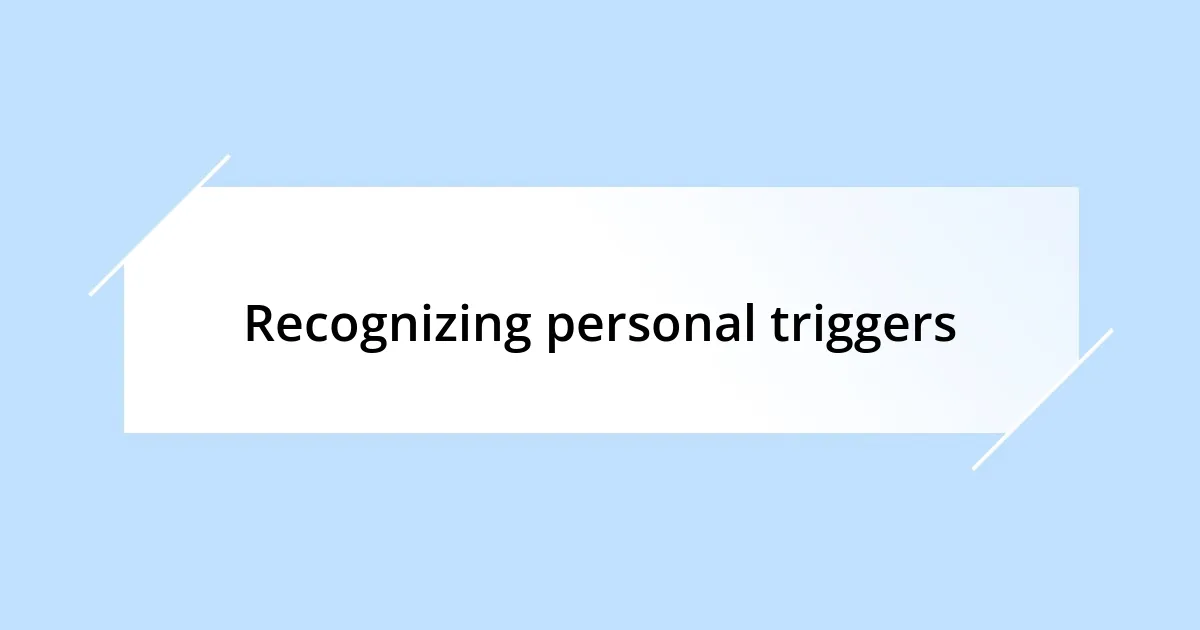
Recognizing personal triggers
Recognizing personal triggers is a crucial step in my journey with criticism. I’ve found that certain phrases or tones can instantly set off my defenses. For instance, if someone uses a condescending tone when providing feedback, I feel a rush of irritation. In those moments, I remind myself to pause and identify why that particular style affects me so deeply. It’s like pulling back the curtain to reveal my insecurities.
Moreover, reflecting on my past experiences has helped me pinpoint specific scenarios that trigger my defensive reactions. One memorable situation involved a mentor who challenged my ideas in a group setting. Initially, I felt embarrassed and angry. But upon reflection, I realized that it wasn’t their words but my fear of being judged that caused my discomfort. Understanding these triggers has enabled me to navigate criticism more constructively.
Through this process, I’ve also discovered that recognizing triggers can transform how I respond to feedback. Instead of reacting impulsively, I now take a moment to breathe and consider the intent behind the criticism. It’s empowering to realize that I have the ability to choose my reaction, rather than letting those triggers dictate my emotions.
| Personal Trigger | Reaction |
|---|---|
| Condescending tone | I feel irritated and defensive. |
| Critique in group settings | I initially feel embarrassed and angry, stemming from fear of judgment. |
| Direct criticism of my ideas | I often feel my self-worth is challenged. |
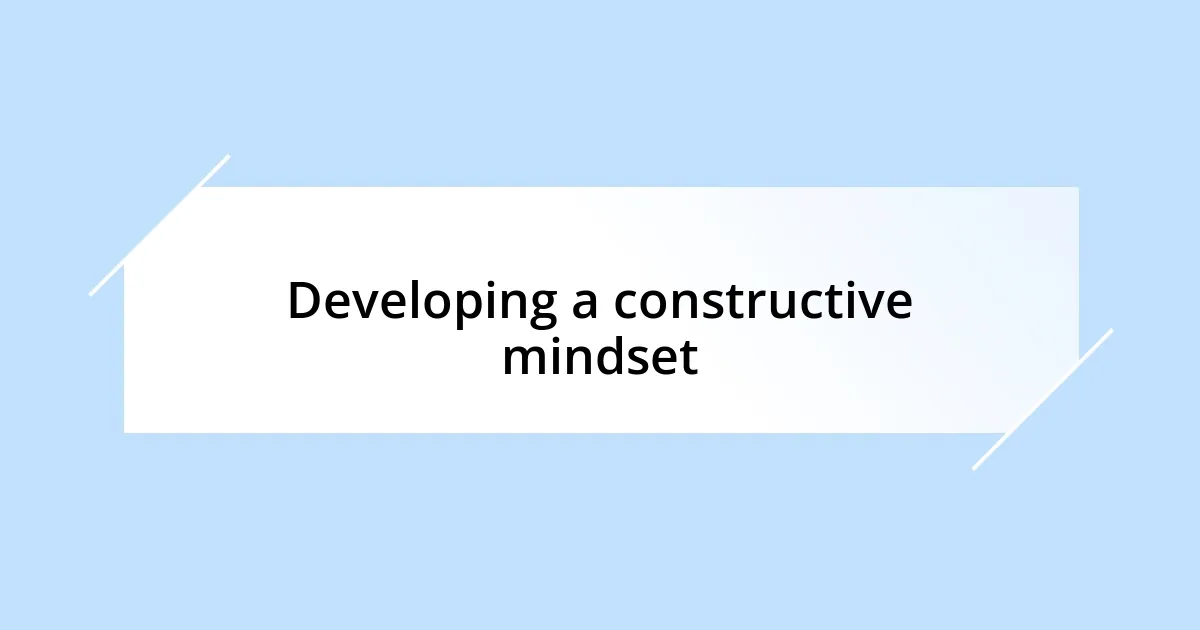
Developing a constructive mindset

Developing a constructive mindset
Embracing a constructive mindset is like opening the door to personal growth. I remember attending a workshop where the facilitator emphasized the importance of viewing criticism as a gift. This perspective shift allowed me to focus less on the sting of feedback and more on the lessons hidden within it. Now, I actively seek out constructive criticism because I understand it holds the potential to sharpen my skills and broaden my perspective.
I’ve found that a practical way to cultivate this mindset is to ask myself specific questions after receiving feedback. This reflection process creates a space for growth rather than defensiveness. Here are some insightful prompts that I use:
- What can I learn from this feedback?
- How can this criticism help me improve?
- Are there any aspects of this critique that resonate with my own observations?
- Is there a recurring theme in the feedback I receive?
- How can I apply this learning to future endeavors?
By reframing my perspective in this way, I transform criticism from a painful experience into an enlightening opportunity. Whenever I’m tempted to feel disheartened, I remind myself of the workshop facilitator’s words: “Every piece of feedback is a stepping stone toward excellence.”
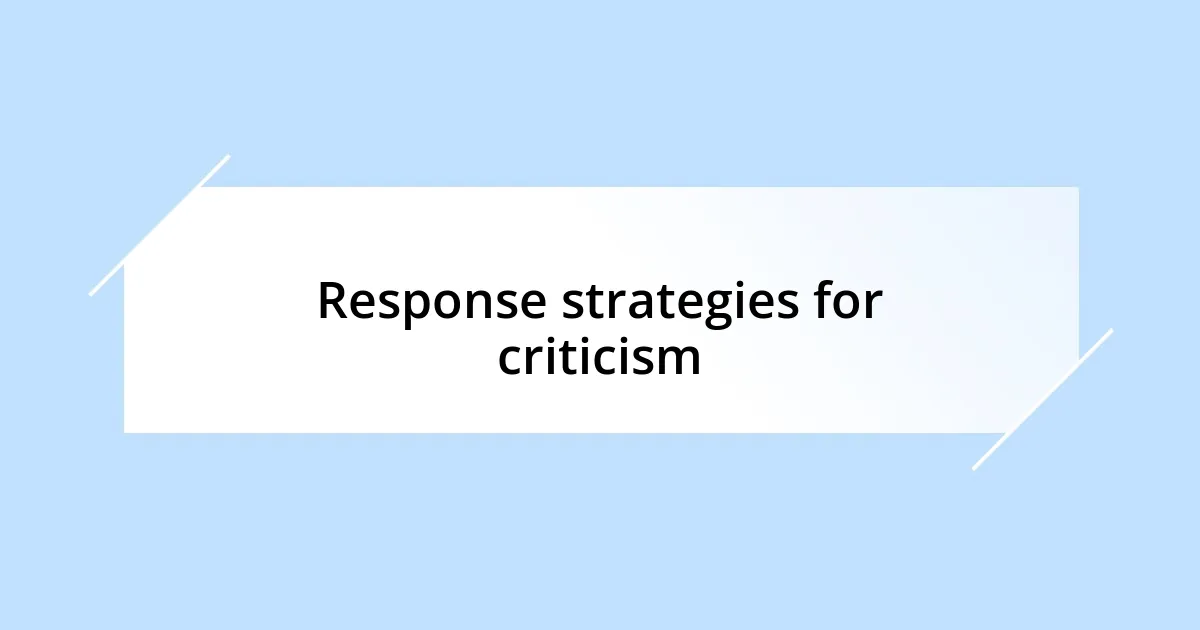
Response strategies for criticism
When facing criticism, I often find myself using the strategy of active listening. I recall a time when a colleague pointed out flaws in a project I was passionate about. Instead of immediately defending my choices, I took a moment to absorb their words. Could this feedback actually hold value? By truly listening, I uncovered insights I had overlooked. It’s a delicate balance; sometimes, the most valuable lessons come disguised as harsh critiques.
Another effective approach I’ve adopted is the ‘pause and reflect’ method. There was an instance where a client reacted negatively to my proposal. Initially, I felt a wave of frustration wash over me. But instead of responding right away, I allowed myself some time to consider their viewpoint. I even jotted down my feelings on paper, which helped me articulate a calm and thoughtful response later. This not only defused my irritation but also opened the door for a productive dialogue. Have you ever felt the weight of immediate reaction compared to a thought-out response?
I’ve also learned the power of seeking clarification. I remember once receiving ambiguous feedback that left me confused and defensive. Instead of assuming I understood their intent, I asked the person to elaborate on their points. This small move transformed the conversation completely; I gained clarity and, surprisingly, found common ground. It’s essential to realize that not all criticism is straightforward. Making the effort to dig deeper can turn a negative experience into a collaborative one. How often do we rob ourselves of understanding by jumping to conclusions?
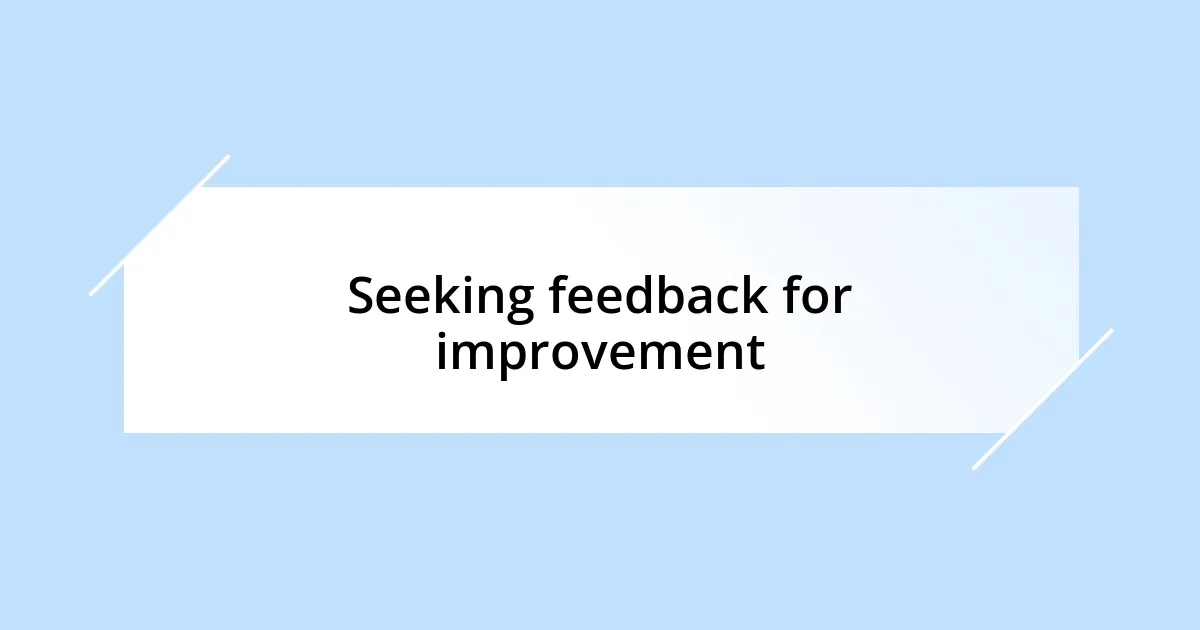
Seeking feedback for improvement
When I actively seek feedback, I often approach it like a treasure hunt. I distinctly remember a time when I presented a concept to my team, wanting their honest thoughts. Instead of waiting for them to volunteer their opinions, I asked pointed questions like, “What aspects do you think could be improved?” and “Where do you see room for enhancement?” This proactive approach not only made my colleagues feel valued but also opened up a candid conversation. This genuine inquiry can turn a potentially awkward situation into a collaborative effort.
Inviting feedback isn’t just about gathering opinions; it’s about creating a safe space for dialogue. I once held a debrief after a project, encouraging my team to share their honest critiques while I promised to embrace their insights without defensiveness. There was a palpable shift in the room—people felt freer to express their thoughts. I learned that when you make it clear you are open to improvement, the feedback becomes richer and more actionable. It’s amazing how vulnerability can foster deeper connections and lead to more constructive exchanges.
I’ve also discovered that following up on feedback is crucial. After receiving a detailed review from a mentor about my presentation skills, I took the time to implement their suggestions. A few weeks later, I reached out to see how they thought I had progressed. The conversation not only reaffirmed what I was doing right but also unveiled areas I could still work on. This ongoing dialogue reinforced my commitment to growth and built a stronger relationship. Have you ever considered that continuing the conversation can be just as important as the initial feedback?
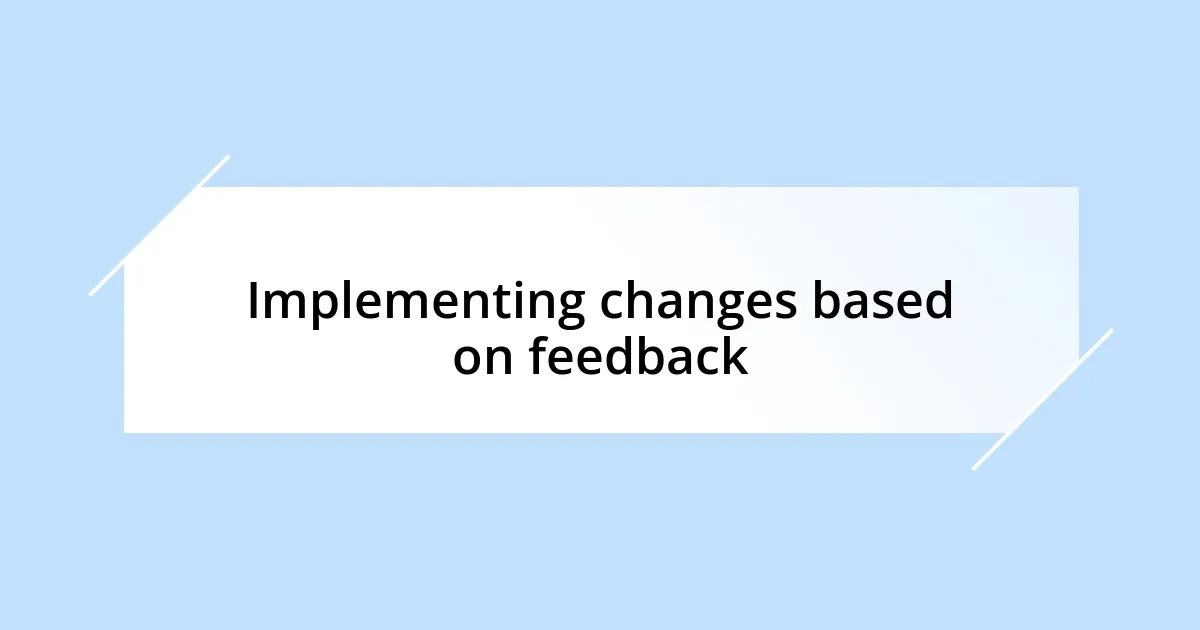
Implementing changes based on feedback
I remember a time when I received feedback on my writing style from an editor. They suggested I simplify certain complex sentences to improve clarity. Initially, I felt a sting of disappointment, but then I realized they were right. I spent the next week diving into my work, cutting unnecessary fluff and ensuring my ideas shone through more clearly. The improvement was tangible. Have you ever noticed how small adjustments can lead to a significant impact?
When implementing changes based on feedback, I often prioritize the suggestions that resonate most with me. There was a particularly constructive piece of criticism about my presentation skills—my pacing was too fast. I focused on this by practicing in front of a mirror, timing my delivery. What surprised me was how much more engaged my audience became once I slowed down. It’s like unlocking a new level of connection. Isn’t it fascinating how adjusting one aspect can elevate the entire experience for everyone involved?
Sometimes, I find it essential to document my journey of implementing feedback. After receiving input about my leadership style, I decided to keep a journal where I could reflect on my interactions with my team. By tracking my progress over time, I noticed patterns that revealed areas for improvement I hadn’t considered before. This process not only helped me to recognize my growth but also provided a valuable framework for continuous learning. How often do we genuinely reflect on feedback to transform it into a catalyst for personal development?
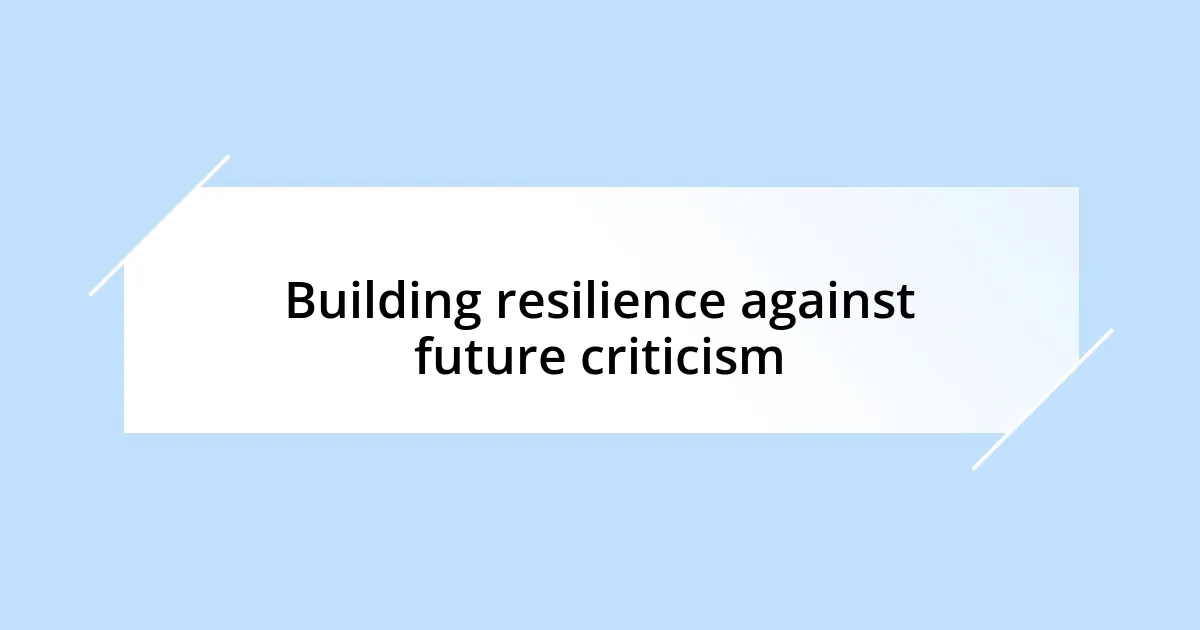
Building resilience against future criticism
Building resilience against future criticism is a journey that requires intentionality. I recall a moment when a peer’s harsh feedback on my project left me feeling deflated. Instead of wallowing in discomfort, I took a step back and asked myself, “What can I learn from this?” This shift in perspective transformed that painful encounter into a valuable learning experience that prepared me for future critiques. Isn’t it empowering to think of criticism as an opportunity rather than a setback?
I’ve also discovered that developing a strong support network can significantly bolster my resilience. During a particularly challenging phase in my career, I reached out to mentors and friends who had faced similar challenges. Sharing our experiences created a sense of camaraderie, reminding me that I wasn’t alone in my struggles. Listening to their stories of overcoming criticism inspired me to embrace my own experiences. Have you ever found strength in the shared vulnerabilities of others?
Practicing self-compassion has proven essential in building my resilience. After receiving a critical remark on my performance, I consciously reminded myself that everyone makes mistakes. I experimented with positive affirmations, reminding myself of my strengths and previous accomplishments. This practice helped me to bounce back more quickly, turning a moment of doubt into renewed motivation. How often do we recognize the power of kindness to ourselves when facing criticism?







